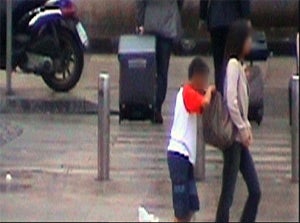Last Night's Television: This World – Gypsy Child Thieves, BBC2
Out Of This Underworld

Support truly
independent journalism
Our mission is to deliver unbiased, fact-based reporting that holds power to account and exposes the truth.
Whether $5 or $50, every contribution counts.
Support us to deliver journalism without an agenda.

Louise Thomas
Editor
There are moments – deeply uncomfortable ones for the liberal spirit – when an ugly prejudice seems to coincide with an ugly fact. Take this remark for example, made by an Italian charity worker in Liviu Tipurita's remarkable film for the This World series,Gypsy Child Thieves. "The right wing says that Romany Gypsies are just people that exploit their children and women for stealing and begging and... maybe there is a bit of truth in this." The concession was a reluctant one, and was a preamble to a substantial and important "but". "The real problem," she went on to add, "... is that some of the Gypsies beg and steal because that's the only chance they have for surviving." That there was truth in that seemed undeniable. The Roma people have been marginalised and despised for hundreds of years. In prosperous European cities – such as Madrid and Milan – they live in conditions of near medieval squalor, squeezed into the unwanted spaces between transport arteries and rubbish tips. Tipurita had filmed in some of these places and they weren't the kind of addresses that were likely to reassure a prospective employer about a candidate's bona fides.
On the other hand, a permissible liberal prejudice was nesting awkwardly inside the unpermissable one – the disgust we freely allow ourselves to feel for those who treat women and children as exploitable commodities. "I got 25 million lei for my daughter in 2004," said one of Tipurita's interviewees, commenting on a wedding celebration he'd captured on film while visiting a Romany camp in Madrid. "This is our gypsy custom," he continued. "If she's a virgin, if she's untouched... she's valuable." And if she's a good thief she'll fetch even more. The 13-year-old virgin whose deflowering was being celebrated was expected to earn back the 7,000 euros she cost in just a few weeks. Should such a thing count as culture or crime? And if you decide, as I would, that it's the latter, exactly when does the mitigation of poverty run out? In his long-lens shots of Gypsy children harrying and plucking at their victims, Tipurita had captured two things simultaneously: what people can be reduced to if they have no other means of staying alive and a Dickensian form of abuse, in which children were being robbed of their childhood. Disentangling the two isn't always easy, though it isn't a problem everyone thinks is worth bothering with anyway. "They are people who should be killed but we can't kill them," said an Italian man, celebrating the bulldozing of a Roma encampment in Madrid, and it was chillingly unclear whether the second half of the sentence was a grudging recognition of moral limits or a complaint that they existed.
Tipurita finished his film with another sequence which made for uncomfortable watching , because it seemed to offer yet more fuel for the bigots. He interviewed a proudly larcenous clan leader in the Romanian town of Craiova who then took him on tour, to show him the results of repatriated filchings: wildly extravagant villas built on rutted, unsurfaced streets. Fortunes founded on theft, his guide explained, were now being sustained by loan sharking, presumably at the expense of the poor Roma families who were still living in brick shacks with only oil lamps for illumination. Here, the Roma were both exploiters and victims. It was a bleak and powerful film, in which the only real glimmer of light came from Italian charity workers who steadfastly clung to the belief that the Roma weren't just a nuisance to be swept from the streets, but people who had problems that needed solving. They weren't a soft touch, by any means, but they'd remembered to hate the sin and not the sinner.
Join our commenting forum
Join thought-provoking conversations, follow other Independent readers and see their replies
Comments